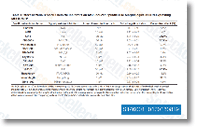In all 14 situations of IHC discordance one pathologist assessed the tumor as obtaining no PTEN staining with all the other pathologist recording weak staining. This substantial lights the subjective nature of IHC scoring, and also the inherent trouble in arbitrary scoring of the steady trait. The problematic inter observer variability of PTEN IHC is often reported during the lit erature but rarely quantified. Lately Sangale et al. evaluated PTEN IHC working with 5 likely PTEN anti bodies on standardized cell lines. With all the chosen op timal antibody a validation study of 50 human tumor specimens made 100% concordance involving 3 independent pathologists using dichotomous reporting of PTEN reduction. The considerable inter observer vari means in PTEN IHC has also been demonstrated in prostate and breast cancer also permitting for optimized assays.
Overall the current literature highlight the problems in accurately measuring PTEN perform to date, measure ment of the single genetic insult, although minimizing inter observer variability, does not capture the frequently coexisting mechanisms expected for biallelic inactivation. selleck chemical The usage of IHC, whilst potentially a much better measure of PTEN function, is observer dependent and there remains a lack of consen sus on optimum methodology and scoring. Given the limitations of PTEN evaluation discussed here, it is not surprising reports on the predictive worth of PTEN being a biomarker in CRC stay conflicting. In contrast, there seems additional consistency in the prognostic role of PTEN in colorectal cancer.
Loss of PTEN expression in key CRC continues to be connected with bad prognostic pathological attributes likewise as increased prices of metachronous liver metastases. Quite a few retrospective cohort studies have demonstrated decreased survival in patients with reduction of PTEN by IHC. This is even so, in contrast TW37 to our cohort of individuals from the MAX clinical trial exactly where reduction of PTEN copy number by Taqman PCR was not prognostic. Conclusion The lack of standardization in assessing loss of PTEN function seems to get contributed considerably to your conflicting results from retrospective cohort studies. Additional elucidation of PTEN as a prospective biomarker for colorectal cancer relies on defining PTEN loss of function and standardizing analytical strategies and scor ing methods.
Long term scientific studies assessing PTEN function could be far better served by acquiring a more in depth evaluation of PTEN perform by assessing PTEN mutation, hypermethylation of PTEN promoter, PTEN allelic loss and protein  expression on every specimen. An choice technique could possibly be to discover improved methods of meas uring reduced protein expression beyond IHC, provided reduced or absent protein expression ought to reflect the practical outcome of PTEN loss irrespective from the gen etic mechanism.
expression on every specimen. An choice technique could possibly be to discover improved methods of meas uring reduced protein expression beyond IHC, provided reduced or absent protein expression ought to reflect the practical outcome of PTEN loss irrespective from the gen etic mechanism.
Mirna Mimics
miRNA inhibitors for single or high throughput silencing
